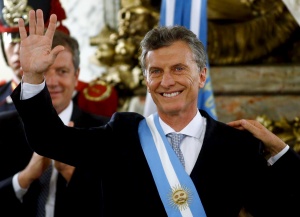Argentinean wine producers furious over proposed wine tax

Argentinean wine producers are up in arms about a proposed tax they claim would crush both exports and domestic sales.
The bill, unveiled by President Marico Macri’s government last week, would introduce a 10% tax on wine for consumers. At present, wine in Argentina is untaxed, unlike beer, mineral water and soft drinks.
In recent years producers in Argentina, which is the world’s sixth largest wine producer and 10th largest exporter, have struggled to remain competitive globally due to high labour, shipping and production costs. Much of Argentina’s wine production – up to 70% - is consumed in the domestic market, but years of double digit inflation has had an adverse impact on local sales. This has not been helped by challenging weather conditions which have devastated crops for the past two harvests.
Wine producers claim any new tax would cripple them and damage their effots to boost exports, at the same time as Macri seeks to open up the country’s economy to the world after more than ten years of protectionism.
“When you don’t have a cost advantage in the domestic market, you cannot compete outside because you have a big chunk of your business here,” said Rafael Calderon, chief executive of Mondeza-based Bodegas Bianchi. In an interview on Tuesday Macri told Reuters that his government was prepared to listen to wine producers’ concerns, adding that he wants Argentina to be a world beating wine exporter.
“We bet on the future of that industry,” he said. “We think we can substantially increase our wine exports in future years if we succeed to open markets because we compete with many other producers.”
Alcohol is subject to much lower taxes in Argentina than in neighbouring Chile, where domestic consumption is taxed at 20.5%. Argentine producers are also peeved about being lumped into the same category as beer, spirits and sugary drinks, claiming that wine has proven health benefits.
However, domestic consumption fell 9.2% in 2016 compared to the previous year according to the National Institute of Viticulture.
Argentine wine producers had hoped for a lifeline from Macri to boost exports in the form of financing or subsidie, but wading into the row Brazil’s Agriculture Minister said the European Union is trying to negotiate access for European wines to the Mercosur trade bloc, which includes Brazil and Argentina.
“This is an industry the government should help to grow abroad. Nobody can do Malbec better than us,” said wine producer Esteban Baigun, director general of Codorniu Group in Latin America. He said his production costs had rocketed by 47% in the last year and claimed it was cheaper to ship wine to China than truck it from Mendoza to Buenos Aires.
Together with other wine producers, he planned to ask the government to consider phasing in the tax gradually, and delaying its inception so the industry has more time to recover. “We understand that we all need to contribute something, but they need to take into consideration that we are struggling,” Baigun said.
